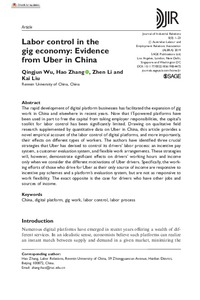Labor control in the gig economy: Evidence from Uber in China

Wu, Qingjun ; Zhang, Hao ; Li, Zhen ; Liu, Kai
Journal of Industrial Relations
2019
Early View
1-23
digital economy ; crowd work ; working conditions
Working conditions
https://doi.org/10.1177/0022185619854472
English
"The rapid development of digital platform businesses has facilitated the expansion of gig work in China and elsewhere in recent years. Now that IT-powered platforms have been used in part to free the capital from taking employer responsibilities, the capital's toolkit for labor control has been significantly limited. Drawing on qualitative field research supplemented by quantitative data on Uber in China, this article provides a novel empirical account of the labor control of digital platforms, and more importantly, their effects on different types of workers. The authors have identified three crucial strategies that Uber has devised to control its drivers' labor process: an incentive pay system, a customer evaluation system, and flexible work arrangements. These strategies will, however, demonstrate significant effects on drivers' working hours and income only when we consider the different motivations of Uber drivers. Specifically, the working efforts of those who drive for Uber as their only source of income are responsive to incentive pay schemes and a platform's evaluation system, but are not as responsive to work flexibility. The exact opposite is the case for drivers who have other jobs and sources of income."
Digital
The ETUI is co-funded by the European Union. Views and opinions expressed are however those of the author(s) only and do not necessarily reflect those of the European Union or the ETUI.